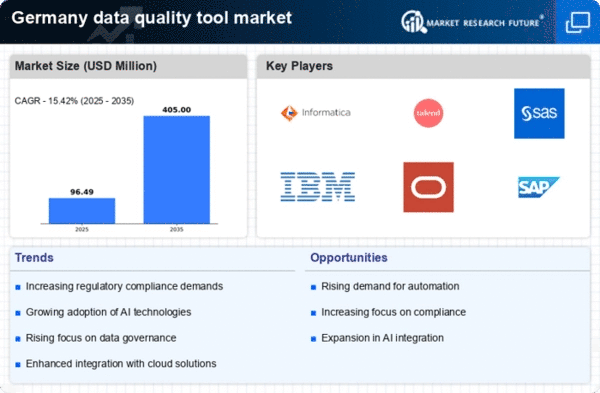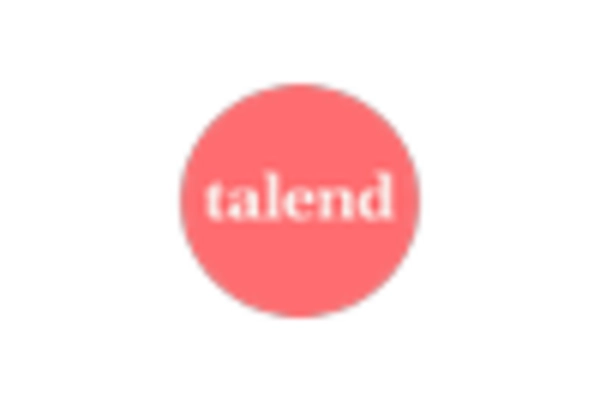Growing Data Volume
The exponential growth of data generated by businesses in Germany is significantly impacting the data quality-tool market. With the increasing reliance on data-driven decision-making, organizations are inundated with vast amounts of information. According to recent estimates, data volume in Germany is projected to grow by over 40% annually. This surge necessitates the deployment of advanced data quality tools to manage, cleanse, and validate data effectively. Companies are recognizing that poor data quality can lead to misguided strategies and financial losses, prompting them to invest in data quality solutions. Consequently, the growing data volume is a pivotal driver for the data quality-tool market, as organizations seek to harness the potential of their data assets.
Regulatory Compliance Pressure
The data quality-tool market in Germany is experiencing heightened pressure due to stringent regulatory compliance requirements. Organizations are compelled to adhere to regulations such as the General Data Protection Regulation (GDPR), which mandates strict data handling and processing standards. This regulatory landscape necessitates the implementation of robust data quality tools to ensure compliance, thereby driving market growth. In 2025, it is estimated that compliance-related investments in data quality tools could account for approximately 30% of total market expenditure. As companies strive to avoid hefty fines and reputational damage, the demand for effective data quality solutions is likely to surge, positioning compliance as a critical driver in the data quality-tool market.
Emergence of Advanced Analytics
The emergence of advanced analytics technologies in Germany is reshaping the data quality-tool market. As organizations increasingly adopt analytics to derive insights from their data, the quality of that data becomes critical. Advanced analytics relies on accurate and clean data to produce reliable results, leading to a growing recognition of the need for data quality tools. In 2025, it is projected that investments in data quality solutions will grow by approximately 35% as organizations seek to enhance their analytical capabilities. This trend suggests that the rise of advanced analytics is a key driver for the data quality-tool market, as businesses aim to leverage data for strategic decision-making.
Digital Transformation Initiatives
Digital transformation initiatives across various sectors in Germany are propelling the data quality-tool market forward. As organizations embrace digital technologies, the need for accurate and reliable data becomes paramount. Companies are increasingly integrating data quality tools into their digital transformation strategies to ensure that the data driving their operations is of high quality. In 2025, it is anticipated that investments in data quality tools will represent around 25% of total digital transformation budgets. This trend indicates a growing recognition of the importance of data quality in achieving successful digital transformation outcomes, thereby serving as a significant driver for the data quality-tool market.
Increased Focus on Customer Experience
In the competitive landscape of Germany, businesses are placing a heightened emphasis on customer experience, which is influencing the data quality-tool market. Organizations are leveraging data to gain insights into customer preferences and behaviors, necessitating high-quality data for effective analysis. Poor data quality can lead to misinterpretations and suboptimal customer interactions, prompting companies to invest in data quality tools. It is estimated that organizations prioritizing customer experience improvements will allocate approximately 20% of their data budgets to data quality solutions in 2025. This focus on enhancing customer experience is likely to drive demand for data quality tools, as businesses strive to deliver personalized and effective services.
















